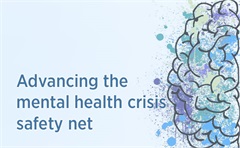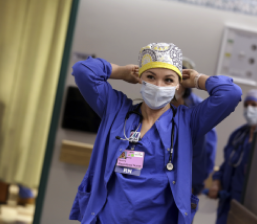Mount Nittany Health's Dr. Faoud Ishmael makes sense of COVID-19 diagnostic testing

Antibody tests, PCR tests, blood tests, nasal swab tests, rapid tests, at home tests – What do these mean and how do we make sense of testing? There are currently 100 COVID-19 diagnostic tests that have been granted emergency use authorization (EUA) by the U.S. Food and Drug Administration. The large number of tests on the market has created confusion, as it is often not clear when, why, or what type of testing is being used when we hear about COVID testing in the news.
In order to interpret the results from these tests, it is important to understand what they measure as well as limitations and drawbacks of testing. Not all of the tests measure the same thing, and in general they can be classified into two categories: Tests for diagnosis of current infection by the SARS-CoV-2 virus, and tests that measure antibody levels.
Tests to diagnose SARS-CoV-2 infection
COVID-19 is a syndrome caused by infection with the SARS-CoV-2 virus, also known as the novel coronavirus. Infection is confirmed by tests that detect the presence of viral particles in the respiratory tract or saliva of a patient. Most of the tests use a method called polymerase chain reaction (PCR) to detect specific genetic components of the virus. Other tests detect the presence of viral proteins (antigen tests). Samples are collected from the back of the nose or saliva using a swab, followed by analysis to detect the virus. The samples are usually collected by a health care provider, but at-home testing has started to emerge as an option. In this case, collection kits are provided by the company for the patient to use at home and they are subsequently shipped back for analysis. While all of these tests can vary in the amount of time it takes to get a result (minutes vs. days), location (analyzed in a lab vs. equipment in a clinic), and manufacturer, they all detect the presence of the virus. A positive test means that someone is currently infected with the virus.
Although these tests are considered the gold standard for diagnosis, false negative tests may occur, where a patient infected with the virus has a negative test result. This can be due to inadequate collection of a sample, when in the time course of the infection the sample was taken, or limitations in the test itself. In some cases, repeat testing may be needed to detect the virus.
Antibody tests
Antibodies to the SARS-CoV-2 virus are produced in the blood starting about two weeks after someone is infected. There are two main types of tests that measure novel coronavirus antibody levels, one that measures levels in blood obtained from a regular blood draw (venipuncture) that is sent to a lab for analysis, and a rapid test using blood from a finger prick that can be performed in a clinic setting in about 15 minutes. In general, the lab test is more quantitative and accurate than the rapid test, which can be more prone to false negative and false positive results. In addition, many of the rapid tests have not been validated, and there are significant concerns about the quality of some of these assays.
There are a number of other concerns with antibody testing. False positive tests may occur. Other coronaviruses are widespread and cause the common cold, and it is possible the assay detects these antibodies in patients that never had COVID-19. Another limitation is that antibody tests cannot be used to diagnose active infection with the novel coronavirus, as antibodies do not appear until about two weeks after someone is infected. A positive antibody test means that someone was previously infected, which could have been weeks or months prior.
Lastly, a positive antibody test does not necessarily mean that someone is protected from reinfection. Someone may have antibodies, but still be at risk of getting infected again. We do not have enough information to know whether there is a certain blood level of antibody that confers protection, or whether antibodies may not be protective at all. As a result, at this time a positive antibody test cannot be used to grant someone an “immunity certificate” or “immunity passport” as has been proposed.
As testing becomes easier to obtain and as we learn more about the virus, it will be easier to diagnose infections and understand how to apply this information to infection control measures.
You may also like
Did you know that Mount Nittany Health has a toll-free automated information line dedicated to closings and cancellations?
Mount Nittany Health Foundation is pleased to partner with Centre Foundation for Centre Gives 2020, a 36-hour online giving event that begins today, May 12 at 9:00 am and ends on Wednesday, May 13 at 9:00 pm. This event is designed to support the great work of local nonprofits serving Centre County.
After the tragic death of Osaze Osagie last year during a law enforcement response to a mental health 302 warrant, the Task Force on Mental Health Crisis was formed.
Mount Nittany Health is proud to salute its nurses during this National Nurses Day and National Nurses Week. National Nurses Week begins each year with Nurses Day on May 6 and ends on May 12, Florence Nightingale's birthday.
Mount Nittany Health is pleased to announce the addition of Jason Schweichler, DO, to Mount Nittany Physician Group Family Medicine at its Mount Nittany Health – Penns Valley location.
Make a difference.
Our donors' generosity enables the growth of expertise, advances in lifesaving technology, program improvements, and facility upgrades that meet the unique needs of the communities we serve.





